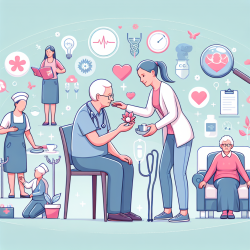Empowering Caregivers: A Path to Better Dementia Care
In the realm of dementia care, caregivers are the unsung heroes, providing invaluable support to patients experiencing behavioral and psychological symptoms of dementia (BPSD). A recent study titled "The Experiences, Needs, and Solutions of Caregivers of Patients With Behavioral and Psychological Symptoms of Dementia Living in Residential and Long-Term Care Centers" sheds light on the challenges caregivers face and offers solutions to improve care outcomes.
Understanding the Caregiver's Role
Caregivers are often the first line of support for patients with dementia, yet their needs and experiences are frequently overlooked. The study identifies six key themes that highlight the challenges caregivers encounter:
- The transition period between home and long-term care facilities
- Lack of knowledge about BPSD
- Approach to BPSD by healthcare professionals
- Communication gaps
- Defining the caregiver’s role within the healthcare team
- The caregiver’s need for respite
Improving Transition and Communication
The transition from home to a long-term care facility is a critical period for both patients and caregivers. The study suggests that providing clear timelines and tasks can help caregivers better prepare for this transition. Additionally, regular updates and a point of contact within the facility can ease the emotional burden on caregivers.
Effective communication is crucial for ensuring quality care. Caregivers often feel left out of the loop, leading to stress and mistrust. Establishing a systematic way to share information about the patient’s daily life and involving caregivers in care planning can bridge this gap.
Enhancing Knowledge and Training
Caregivers possess unique insights into the patient's needs and behaviors, yet they often lack formal training in managing BPSD. The study advocates for providing caregivers with basic training on BPSD and involving them in developing non-pharmacological strategies. Self-help groups can also offer a platform for caregivers to share experiences and learn from one another.
Redefining the Caregiver's Role
Caregivers should be seen as partners in care, not just as visitors. Defining their role within the healthcare team can lead to better collaboration and improved care outcomes. Caregivers want to be involved in decision-making processes and have their insights valued by healthcare professionals.
Addressing the Need for Respite
The emotional and physical toll of caregiving can be overwhelming. Caregivers need opportunities for respite to maintain their well-being. Facilities should implement strategies to improve care quality, reducing the caregiver's burden and allowing them to focus on their own health and relationships.
Conclusion
The study highlights the importance of empowering caregivers through improved communication, training, and collaboration. By addressing the needs and challenges of caregivers, healthcare facilities can enhance the quality of care for patients with dementia and support the well-being of those who care for them.
To read the original research paper, please follow this link: The Experiences, Needs, and Solutions of Caregivers of Patients With Behavioral and Psychological Symptoms of Dementia Living in Residential and Long-Term Care Centers.










